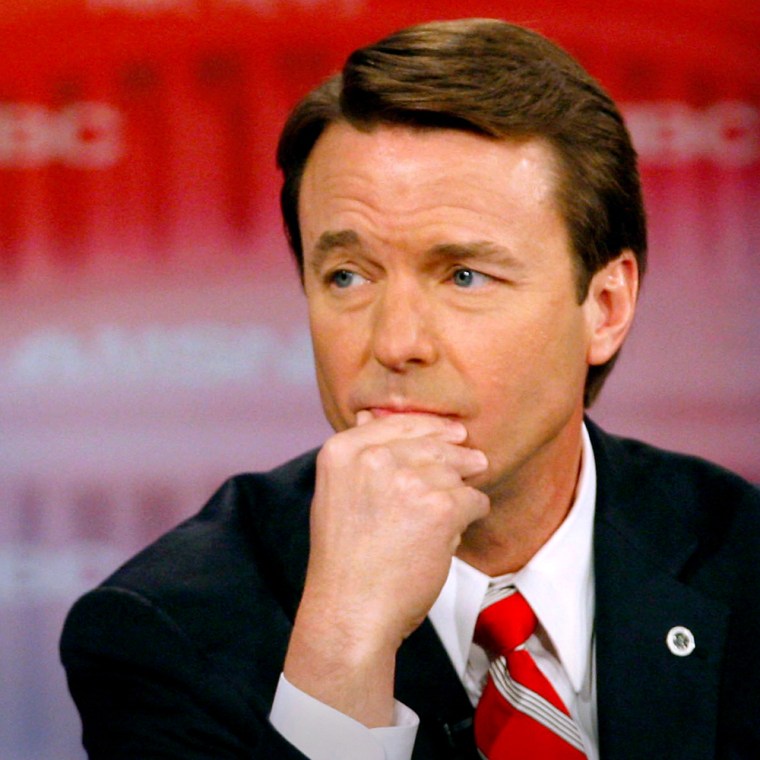In the four years after his first White House bid, John Edwards stayed in the spotlight. In the four months since he abandoned his second bid, he's all but disappeared.
A quick interview with Jay Leno. A couple of low-key speeches. A few North Carolina basketball games with his wife and children. That's about it. If Edwards has made up his mind between Sens. Barack Obama and Hillary Rodham Clinton, not only is he keeping quiet about it, he's not even putting himself in a position where he might be asked.
The silence from Chapel Hill hasn't gone unnoticed.
"I'd like a signal. I'd like to know what he thinks," said Gary Pearce, a Democratic consultant who advised Edwards during his successful run for Senate in 1998. "He was on stage with these two people, and he knows more about them than anyone in the world. Who is in a better position to say, 'Let me tell you about these people?'"
Edwards is even acting coy in private. Rep. Mel Watt, one of North Carolina's superdelegates to the Democratic National Convention and the former chair of the Congressional Black Caucus, wanted to consult with Edwards before making a decision about his own endorsement. Watt said he called a few times to speak with Edwards, but never heard back.
Watt ended up passing along a message through Edwards' wife Elizabeth after making up his mind to back Obama.
"I presume if he had a concern, he'd call," Watt said.
How much impact does Edwards have?
Obama and Clinton have traveled to lobby Edwards, flying to North Carolina for visits at his Chapel Hill home that both candidates tried to keep secret. Neither has managed to win over the 2004 vice presidential nominee, and it's not clear either will until the nomination has been settled.
"I don't anticipate that he'll make an endorsement," said John Moylan, a close friend to Edwards and longtime adviser. "I think that he will support the Democratic nominee - that there is a need for party leaders who can act in a unifying position. And he's one of the people who can do that."
At this point, it's possible Edwards' endorsement wouldn't have any bearing on the May 6 North Carolina primary. He was unable to win North Carolina for 2004 presidential nominee John Kerry, and polls showed Edwards lagging in North Carolina before he dropped out this year. Current surveys show Obama with a wide lead in the state, and he is expected to get a boost from the huge number of new registrations among black voters.
Before leaving the race, Edwards won a promise from both of the Democratic hopefuls to continue to press for policies that would alleviate poverty, and they both responded. Two weeks after Edwards exited, Obama gave a major speech on how he would address economic disparities. Earlier this month, Clinton said she would create a Cabinet-level position dedicated to poverty.
David Bonior, the former Michigan congressman who managed Edwards' 2008 campaign, said he expects Edwards - a former trial lawyer whose only election victory was his first, a 1998 run for Senate - and his wife to step back into public life to push for action on poverty and others issues that were at the heart of his presidential campaign
Edwards campaign for the economy
"I think he's caught his breath, and I think you'll be hearing his voice more," Bonior said. "I wish that he would speak up more on those issues that he cares about."
That has slowly started to happen - with Elizabeth Edwards. She recently signed on as a visiting fellow at Harvard University's Institute of Politics and started as a fellow at the Center for American Progress to advocate on health care issues. The Washington-based think tank was founded by John Podesta, President Clinton's former chief of staff.
She has touted Clinton's health care plan as superior to Obama's, but has also declined to endorse either candidate.
Both John and Elizabeth Edwards declined repeated requests for an interview through their aides, and John Edwards declined to talk with reporters after accepting an award last month at a Young Democrats convention near his home. Edwards gave a brief speech at that event, praising Obama's inspiration and Clinton's leadership.
The Edwards' recent stretch of privacy comes after years of near constant scrutiny. Edwards launched his first presidential campaign in September 2003, and really never stopped campaigning for the White House until dropping out of this year's race.
Even after Elizabeth Edwards was diagnosed with cancer and went through chemotherapy following the 2004 election, the couple continued public activities. She wrote a memoir. He launched a poverty center at the University of North Carolina at Chapel Hill and campaigned around the country for Democrats and effort to boost the minimum wage. Both did book tours.
After her cancer returned in early 2007, he remained in the race and she continued to campaign. Those efforts helped Edwards compete with Obama and Clinton, despite their wide leads in fundraising, in the leadoff Iowa caucuses. He finished second there, but quickly faded and won only 26 delegates before exiting the race at the end of January.
Now some of those delegates have already moved to new allegiances, and Edwards' superdelegates and staffers - no longer willing to wait - are picking sides.
"I'm, of course, a friend of John Edwards, but we did not consult on this," said Rep. David Price, who represents Edwards in Congress, as he endorsed Obama this week. "I'm acting on my own in this respect."
